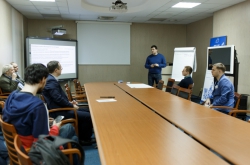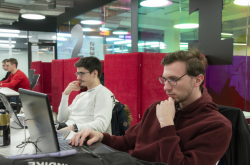As Sergey Garbuk, deputy general director of Advanced Research Foundation, explains, work on the creation of the National Center for Cognitive Technologies’ consortium has been going for more than a year. ITMO University recently became a winner of a grant competition for universities and scientific organizations in the field of machine learning and cognitive technologies, organized by the Russian Ministry of Education and Science. As part of its work via the grant, the university will conduct research with real-life applications. There are currently 17 constant members of the consortium, including ITMO University, hi-tech companies (MTS, Diakont, Mail.Ru and others), universities and research institutes (Almazov National Medical Research Centre, Keldysh Research Center, Far Eastern Federal University and others) and organizations interested in the use of machine learning and cognitive technologies (ITMO Highpark, Skolkovo Foundation, and others).
“We want the consortium to work towards practical solutions for issues faced by our partners in the fields of IT and artificial intelligence. ITMO University is at the core of the consortium’s functions, and is responsible for the management, the creation of necessary infrastructure and working with customers,” explains Sergey Garbuk.

It is not by chance that so many organizations from various fields of economics are involved in the work. It is only through the collaboration of members of the real sector, universities, foundations, and others that projects can be made that will find demand on the market. At the session, Alexander Boukhanovsky, head of ITMO’s School of Translational Information Technologies, told the audience about the most promising research in the field and what tasks the consortium must accomplish to develop useful technology and successfully introduce it to the market.
Systems that are able to learn and provide decision support will eventually let people avoid doing routine tasks, as well as generate knowledge and transfer and process information. One approach that will be beneficial to the development of successful, functional cognitive technologies is the creation of digital prototypes of the real world, ones that include a myriad of uncontrolled and spontaneous elements. This approach was used when creating a model of the satellite-city Yuzhny. Researchers from eScience Research Institute built a model that took into account the transport and social infrastructures of the city that will be home to ITMO’s Highpark campus.

Such an approach includes humans and the peculiarities of their behavior. This, for instance, can help provide better personnel management in organizations and maintain not just their efficiency and productivity, but also their mood and attention. ITMO.NEWS has previously spoken about such research to Vitaly Zubchenko, a member of the Expert Board at NeuroNet. The same approach can be used to predict and analyze the opinion of social media users of members of various communities.
Another area of application for machine learning and cognitive technologies is medicine. eScience Research Institute is already working with the Almazov National Medical Research Centre on a decision support system that would help effectively dispatch ambulance cars to patients by taking into account their location. There are also applications in biometrics, gaming, speech recognition, and written language, automated transport, digital production, and education. A notable area is smart-city technologies and infrastructure.

Machine learning also helps solve issues in finance, law and many other fields. Banks use it to market various services to each specific customer. As for the legal system, cognitive technologies and machine learning might help predict how long it would take for new regulations to be adopted by the legal system and how to make sure they are applied in courts. Big data can be used to track areas of concentration of criminal activities like, for instance, prostitution or drug trade. Research of this kind has already been conducted at ITMO University with the involvement of Peter Sloot, a professor from the University of Amsterdam.
“All research of this kind requires three stages. The first is procedural and informational support, including the collection of data. The second is building an infrastructure that would process and analyze this data, and then use it to build models. And the third is creating procedures and methods that would verify the correctness and efficiency of chosen approaches and technologies,” explains Professor Boukhanovsky.
Which estimated future changes will have an effect on the development and use of machine learning and cognitive technologies? It’s well understood that the amount of data grows month by month, and this resource will be used more and more in creating predictive models, analyzing the market and more. Solutions will be made at an increasing rate, and each player on the market will want to get ahead. Thanks to the emergence of a growing number of various models, some business processes, and perhaps even some of the social ones, will be made virtual: it would be much easier to test a product not with a focus group, but with a model of one. Finally, people will desire to see proven, substantialized explanations of actions that had once been made based on gut feeling and experience.

“In essence, we’re talking about a sub-technology called systematic artificial intelligence. It would consist of complex systems that combine elements of both artificial and natural intelligence in one. This is a response to the challenges of the future that deal with sustainable development and the pervasiveness of technology in human life,” concludes Alexander Boukhanovsky.
As part of the two-day session, experts of the National Center for Cognitive Technologies also discussed the Center’s business models, the participants’ projects, the prospects of training new specialists in the development of machine learning technologies, and other topics.





